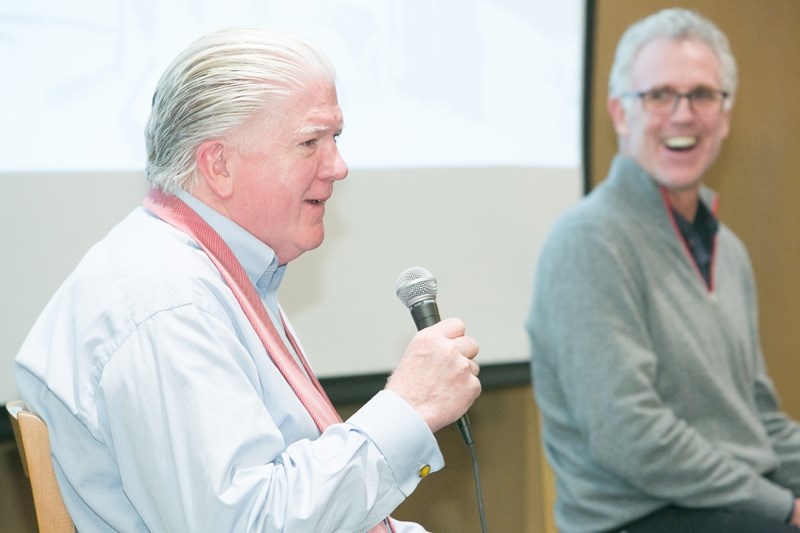It's a lot harder to make trades now than it was a couple of decades ago, thanks to the salary cap, two NHL executives told an Olds audience.
Calgary Flames president of hockey operations Brian Burke and Edmonton Oilers vice-president of hockey operations Craig MacTavish gave that assessment during the Every Kid Every Community speaker series at the Pomeroy Inn & Suites on Feb. 2.
The event was a fundraiser for minor hockey, the Olds Grizzlys and Olds College Broncos hockey.
"In terms of making trades, it's very difficult to do in today's-era NHL with the salary cap. Things have to mesh perfectly," MacTavish said.
"MacT's right. There are hardly any trades any more because of the salary cap. The money's got to line up," Burke said. "You used to have hockey people in the room. Now you have accountants in the room."
That said, valuable trades can still be made, MacTavish indicated.
"I think really the best trades are when you're on a good team and you're trying to add something to your team for the playoff runs, I think those trades are maybe the most exciting to make when you're gearing up for a playoff run. But they're very difficult," he said.
"And you have to be cautious I think when you're evaluating. Somebody told me this about one of my old teammates when I played for (former NHL head coach) Mike Keenan: ‘who's he trying to get? Everybody he doesn't have.' ‘Who's he trying to get rid of?' ‘Everybody he's got,'" MacTavish added, sparking laughter.
"So you have to be careful, because when you're around your own players as much as we are, you can get very critical. And all of a sudden, the things they do poorly outshine the things that they do well. And when you're not around them as much, the positive aspects of their game really shine much more."
Burke said general managers and other hockey executives have to remember that while they're trying to get a better deal than the guy they're trading with, so is that guy.
"It usually goes the other way," Burke said to laughter. "You've got to remember, when you make a trade, you hang up and you're thinking to yourself, ‘I just skinned that guy.' And he's hanging up saying the same thing: he just skinned you.
"In an ideal world, you both do well with the trade, but a lot of times, you get skinned. And I'm often asked when I speak publicly ‘what's the worst trade you made?' And I always say the same thing: ‘how much time do you have?' I've made some horrible trades.
"I traded a non-playoff second-round pick when I was in Vancouver for Vadim Sharifijanov and you're all going, ‘who?' And I'm going, ‘exactly,'" Burke said, sparking more laughter. "Not a good trade.
"The key is, you've just got to make more good ones than terrible ones and people keep giving you jobs."
Burke said today's general managers (GMs) tend to be nicer than GMs were when he broke into the business a couple of decades ago.
Instead of trying to fleece their competitors, these GMs try to "find deals that work for both teams. ‘How can I get what I need and how can you get what you need,'" he said. "They're much nicer guys than we were."
Some trades can be nerve-wracking, Burke said.
For example, when he was in Vancouver, Burke did a series of deals to acquire NHL stars Daniel and Henrik Sedin.
"Those kids didn't come the first year. Then they didn't put up any numbers for the first three years," Burke recalled.
"And you know, I gave up a lot – I gave up Bryan McCabe and a first (round selection) just to get that second pick. The papers were like, ‘hey, great creativity. No one's ever second and third overall before. But we'll see.' It's one of those things: you go to mass and pray and hopefully you're right."
It was worth the risk for Vancouver, MacTavish said, noting the Sedin twins went on to "beat on us for 10 years. Mercilessly."
"They're ungrateful bastards because they have haunted me everywhere I've gone," Burke said. "When we played Vancouver those kids have haunted me. I hate 'em," he added, sparking loud laughter.
"I have an NHL record. Unlike Craig, I did not play in the NHL, but I have an NHL record. I've been the GM of more teams than anyone else," Burke said. "It's a record nobody wants – nobody."
On a related topic, MacTavish said in his opinion, coaching is "by far, the most difficult job in hockey" because "it's the most visible, it's the most easily criticized, critiqued."
"(Former NHL coach and general manager) Harry Neale once had a great line," MacTavish added. "He said ‘in coaching, what you're really trying to do is keep the 18 guys who hate you away from the three guys who haven't made their minds up.'"
"The key is, you've just got to make more good ones than terrible ones and people keep giving you jobs."
BRIAN BURKE
CALGARY FLAMES PRESIDENT OF HOCKEY OPERATIONS



